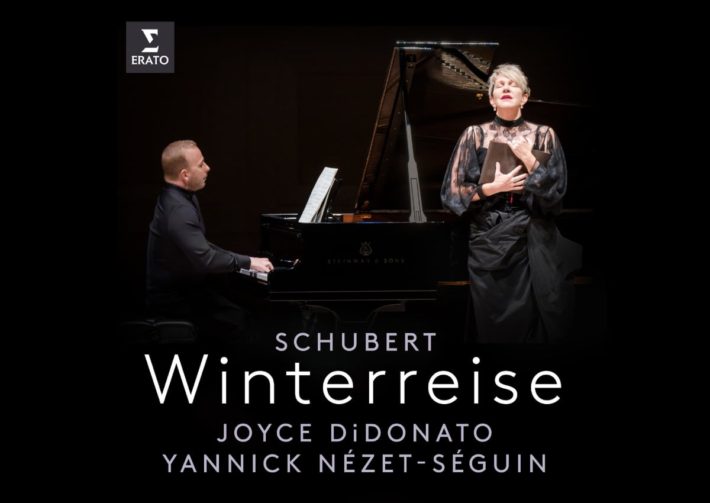The interesting thing about song cycles is their lasting versatility: though composers may write them for a specific vocal range, they can be fair game for others. In a cycle as narrative and nuanced as Schubert’s Winterreise, this can have quite an impact on the way we perceive and appreciate it. Winterreise was originally intended for a tenor but others have made fine recordings: for example. Dietrich Fischer-Dieskau – a baritone – made seven different ones during his lifetime with pianists including Gerald Moore, Alfred Brendel, and Daniel Barenboim. Several mezzos like Christina Ludwig, Brigitte Fassbaender and more recently Alice Coote, have also presented the cycle. Following suit in a recital at Carnegie Hall, mezzo-soprano Joyce DiDonato partners with conductor Yannick Nézet-Séguin, who revisits his roots as a pianist.
The opening Gute Nacht (track 1) is transposed down a full step to C minor, which blankets the song in a darker hue. The consistency of the accompanimental figure normally makes me see the pianist as a distant but reminiscent bystander, but Nézet-Séguin takes a more forward stance. He bends the tempos slightly at certain points and shapes the dynamics correspondingly – a fitting choice, given DiDonato’s equally emotive approach that introduces a raw heartache to the underlying plaintiveness. The duo plays extremely well to Schubert’s color changes, especially in places like the simultaneously delicate and heartfelt major section.
Although the title translates to “Numbness,” Erstarrung (track 4) has an urgency central to the music. It’s interesting to see how different pianists achieve this aim in their openings: Gerald Moore (1962, with Fischer-Dieskau) couples a faster pace with fluttering triplets. Nézet-Séguin takes a noticeably slower tempo; in bringing out the left hand melody, however, he cleverly maximizes the growl of the instrument’s lower register for dramatic effect. This immediately establishes a dichotomous relationship with DiDonato’s silky tone which, on more than one occasion, underscores feelings of tenderness. Fischer-Diskau, on the other hand, fills the phrases with more angular but equally beautiful intensity. As in Gute Nacht, the duo makes evident their thoughtful and successful communication by seamlessly connecting melodic figures present in both voice and piano.
Related Classical Music Reviews
- Review: Schubert – Winterreise – Ian Bostridge, Thomas Adès (2019)
- Review: “The Wanderer” – Seong Jin-Cho Plays Schubert, Berg and Liszt
- Review: “The Divine Muse” – Mary Bevan – Soprano, Joseph Middleton – Piano
It’s not only the melancholy selections in which the duo shines – some of the more joyful songs such as Die Poste (track 13) have an inviting buoyancy. Curiously, this performance retains the original key of E-flat; this seems to evoke a heroic temperament further enhanced by Nézet-Séguin’s cleanly articulated rhythmic gallop. The vocal line, brought up an octave, displays a timbre in DiDonato that radiates ebullience. consequently, We really get to feel firsthand the protagonist’s anticipation described in Müller’s poem. Frühlingstraum (track 11) is more a kaleidoscope of different sentiments, from the blissful lullaby of the opening to the sudden appearance of a storm seconds later. The song’s difficulty lies in the ability to make expressive pivots without sounding contrived or choppy; the performers do this wonderfully, making the shifts sound natural yet still dynamic.
Of course, we cannot go without mentioning the enigmatic and desolate final song, Der Leiermann (track 24). DiDonato’s clarity makes her voice resemblant of a haunting flute that complements the piano’s quiet drone. As far as other live recitals go, we definitely want to consider Thomas Quasthoff with Daniel Baremboim at the Berliner Philharmonie (2005). For me, Quasthoff’s performance of this song captures the true essence of its mystery. He is not so much reflective as prophetic: his lines, so even yet still pronounced, seem to offer a final commentary to the cycle as a whole. This rendition might be hard to match, but DiDonato and Nézet-Séguin come pretty close in their artistry. The only thing missing is the eccentric lilt in the accompaniment – the pianist could emphasize this more to express the sad irony of the hurdy-gurdy’s song.
The acoustics at Carnegie Hall’s Perelman Stage bring out the best of Nézet-Séguin’s richness and DiDonato’s brightness. Meanwhile, the sound engineering helps filter out the extraneous noises from the audience for an optimal listening experience. The liner notes, too, are nicely curated and include a lovely introduction from DiDonato.
Despite some remarkable recordings out there, the duo holds their own in a fine interpretation that I’d gladly keep in my collection and revisit often — warmly recommended.

Schubert – Winterreise, D. 911
Joyce DiDonato – Mezzo-Soprano
Yannick Nézet-Séguin – Piano
Warner Classics / Erato, CD 9029528414
Recommended Comparisons
Read more classical music reviews or visit The Classic Review Amazon store











